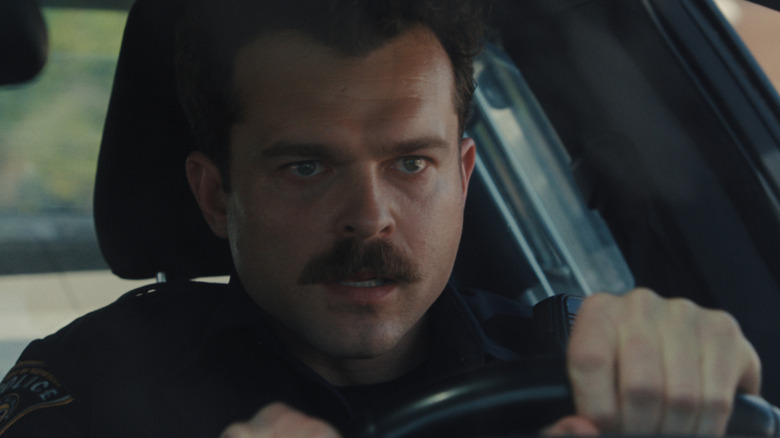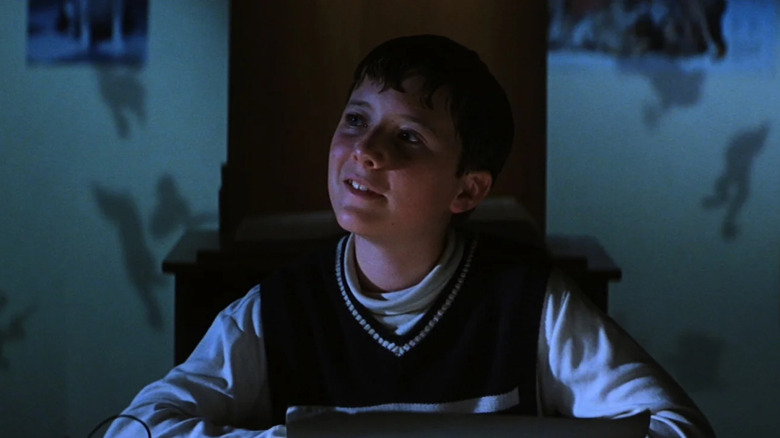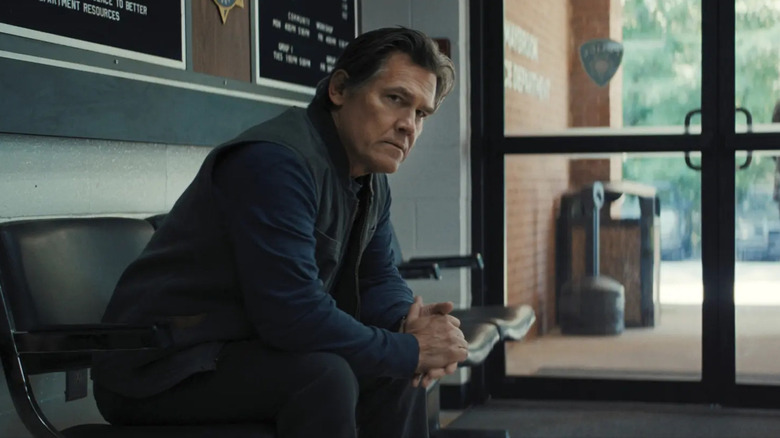The Classic Paul Thomas Anderson Movie That Inspired Weapons
Mild "Weapons" spoilers follow.
Zach Cregger's excellent new horror film "Weapons" takes an unusual storytelling approach. Rather than stick with one linear narrative, Cregger paints a mosaic, weaving a sprawling tale from several different perspectives. Of course, Cregger didn't invent this method of movie storytelling — but you don't usually see it applied to horror movies. Instead, this is the type of format used by filmmakers like Robert Altman — see "Nashville" and "Short Cuts" as prime examples. Quentin Tarantino's breakout hit "Pulp Fiction" also followed a similar path, telling several interconnected stories from various points of time.
And then, of course, there's Paul Thomas Anderson's gargantuan drama "Magnolia." Released in 1999, Anderson's film — which clocks in at a whopping 188 minutes — follows several different interconnected characters around Los Angeles as they cross paths over a short period of time. After Anderson broke out in a big way with "Boogie Nights," New Line Cinema came to the filmmaker and gave him almost complete freedom for his follow-up. "Basically, New Line came to me and said, 'Whatever you want to do next,'" the filmmaker told The New York Times. ”I was in a position I will never ever be in again."
"Magnolia" occupies a strange place in Anderson's filmography. He would go on to make even better films, and in the years since it's release, the "There Will Be Blood" director seems slightly embarrassed to have taken such a big swing. "I'd slice that thing down," Anderson told Marc Maron when asked about the film. "It's way too f***ing long." Too long or not (I'd argue it's just the right length), "Magnolia" is a fascinating movie — and it ended up inspiring Zach Cregger when he sat down to write "Weapons."
Like Magnolia, Weapons tells one big sprawling story via different perspectives
As "Weapons" opens, a narrator — a little girl who we never actually meet in the film — sets things in motion, telling us that "a lot of people die in a lot of really weird ways in this story." We learn that one night (or technically, morning) at 2:17 AM, 17 children wandered out of their homes in the suburban town of Maybrook, ran off into the darkness, and vanished without a trace. "Magnolia" also opens with narration (courtesy of the late, great Ricky Jay), telling us about a series of strange, surreal coincidences. "And it is in the humble opinion of this narrator that this is not just 'Something That Happened,'" he says. "This cannot be 'One of Those Things.' This, please, cannot be that ... This was not just a matter of chance. Oh, these strange things happen all the time." Such a sentiment could be describing the events of "Weapons," too.
After the opening, "Weapons" then takes its time telling a story from the POV of several different characters. There's Justine Gandy (Julia Garner), the teacher of the missing kids. There's her on-again/off-again friend with benefits Paul (Alden Ehrenreich), a local cop and recovering alcoholic (Ehrenreich sports a mustache that makes him look similar to John C. Reilly's cop character in "Magnolia"). There's Archer (Josh Brolin), the distraught father of one of the missing kids who launches his own amateur investigation. There's James (Austin Abrams), a homeless addict prone to committing burglaries to pay for his drug habit. There's the sympathetic but doomed school principal Marcus (Benedict Wong). And then there's poor, tormented Alex Lilly (Cary Christopher), the only kid from Justine's class who didn't disappear.
From these various perspectives, we get a larger story of supernatural horrors lurking under the surface of suburbia, and Cregger's script is excellent at slowly but methodically filling in the blanks, allowing the audience to piece the mystery together as the story unfolds. Unlike "Weapons," "Magnolia," isn't a horror movie nor is it a mystery. But it does give us a large story about love and loss through the POVs of multiple characters, all of whom cross paths one way or another, in a fashion very similar to "Weapons."
Zach Cregger thinks of Weapons as an 'ancestor' of Magnolia
Obviously, "Weapons" is a very different movie than "Magnolia" in terms of the story it's telling. But the format of "Magnolia" was a distinct inspiration on writer-director Zach Cregger when he sat down to pen the script.
"Magnolia" [is] a big [influence]," Cregger told me during an exclusive interview, adding:
"[B]ecause it's a big ensemble and it's totally proud to be an epic movie and to be a little bit messy. It paints with all these different colors, but it has such a specific palette, and it's sad and it's funny and it's everything. I just love the audacity of that movie ... I think of ['Weapons'] more as this is an ancestor to 'Magnolia,' then it gives me license to just kind of think differently about how I'm writing it."
The very concept of a "horror epic" is exciting to me as a horror fan, and I'm very curious to see if any other filmmakers pick up on this idea and run with it. Give me more "Magnolia"-inspired horror epics, please.
"Weapons" is now playing in theaters.


